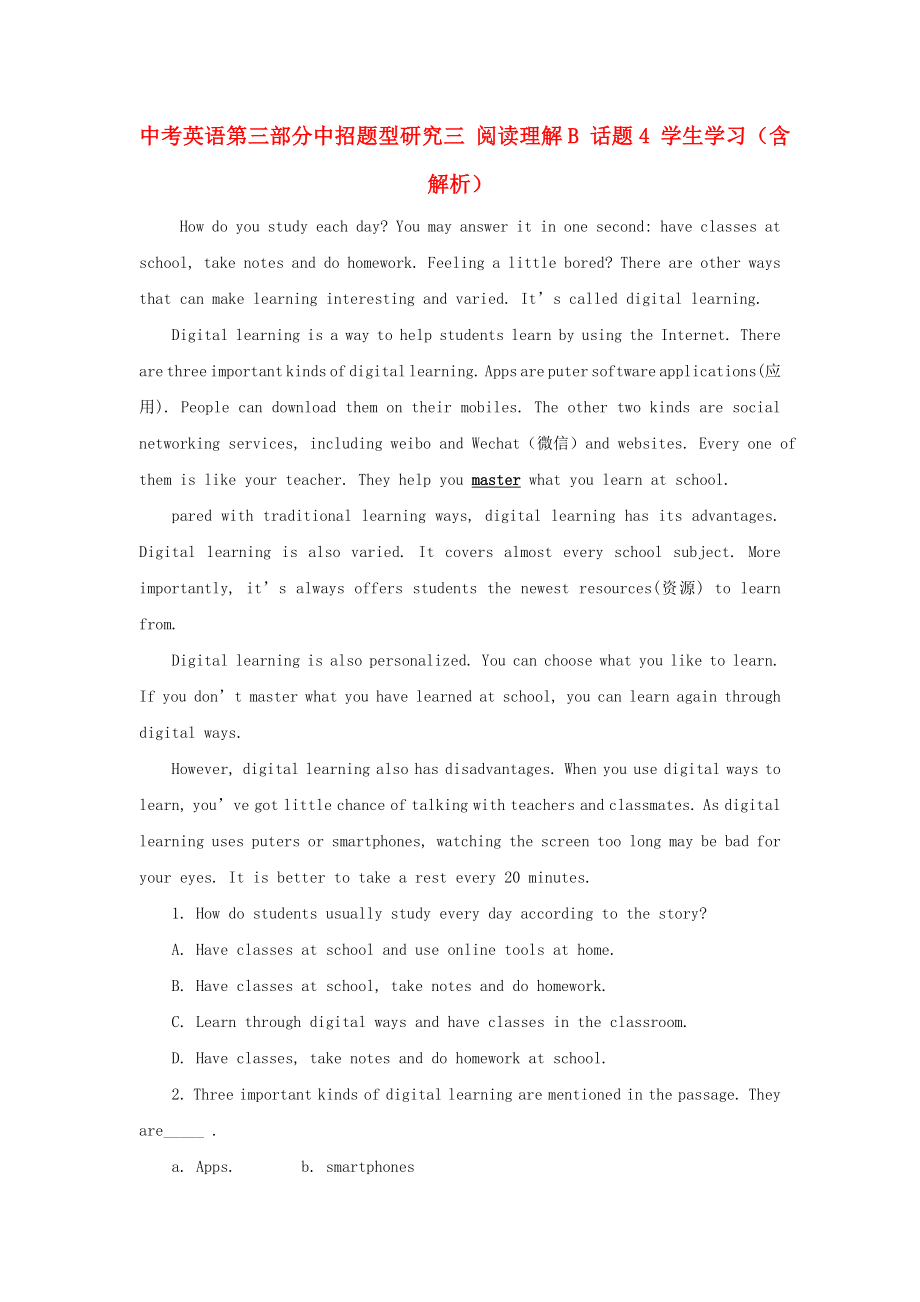《中考英語第三部分中招題型研究三 閱讀理解B 話題4 學(xué)生學(xué)習(xí)(含解析)》由會員分享��,可在線閱讀����,更多相關(guān)《中考英語第三部分中招題型研究三 閱讀理解B 話題4 學(xué)生學(xué)習(xí)(含解析)(3頁珍藏版)》請在裝配圖網(wǎng)上搜索。
1�����、中考英語第三部分中招題型研究三 閱讀理解B 話題4 學(xué)生學(xué)習(xí)(含解析)
How do you study each day? You may answer it in one second: have classes at school, take notes and do homework. Feeling a little bored? There are other ways that can make learning interesting and varied. It’s called digital learning.
Digital learning is a way t
2����、o help students learn by using the Internet. There are three important kinds of digital learning. Apps are puter software applications(應(yīng)用). People can download them on their mobiles. The other two kinds are social networking services, including weibo and Wechat(微信)and websites. Every one of them is
3、like your teacher. They help you master what you learn at school.
pared with traditional learning ways, digital learning has its advantages. Digital learning is also varied. It covers almost every school subject. More importantly, it’s always offers students the newest resources(資源) to learn from.
4�����、
Digital learning is also personalized. You can choose what you like to learn. If you don’t master what you have learned at school, you can learn again through digital ways.
However, digital learning also has disadvantages. When you use digital ways to learn, you’ve got little chance of talking wit
5����、h teachers and classmates. As digital learning uses puters or smartphones, watching the screen too long may be bad for your eyes. It is better to take a rest every 20 minutes.
1. How do students usually study every day according to the story?
A. Have classes at school and use online tools at home.
6、
B. Have classes at school, take notes and do homework.
C. Learn through digital ways and have classes in the classroom.
D. Have classes, take notes and do homework at school.
2. Three important kinds of digital learning are mentioned in the passage. They are_____ .
a. Apps. b. smartphon
7��、es
c. puters d. websites
e. mobiles f. weibo and WeChat
A. a b f B. a d f C. b c e D. c d e
3. What does the underlined word “master” mean in Chinese���?
A. 復(fù)習(xí) B. 分析 C. 掌握 D. 歸納
4. What is the problem of digital learning?
A. You can’t municate with your cl
8��、assmates or teachers.
B. You have to use both puters and smartphones.
C. You can’t decide what you want to learn by yourself.
D. It’s impossible to learn from the newest resources.
5. How can you protect your eyes when learning in digital ways?
A. Try to take a rest for 20 minutes when watching
9��、 the screen.
B. Try to use traditional ways to learn as often as possible.
C. Try to take a break every twenty minutes if possible.
D. Try to learn through digital ways less than 2 hours a day.
【主旨大意】本文是一篇說明文�����。介紹了一種新型的學(xué)習(xí)方式——數(shù)字化學(xué)習(xí)�。它有助于學(xué)生利用網(wǎng)絡(luò)學(xué)習(xí)。它涵蓋了幾乎所有學(xué)科���,更重要的是��,它總是
10���、會不斷更新����,為學(xué)生提供最新的學(xué)習(xí)資源。
1. B【解析】細節(jié)理解題��。題干意為:根據(jù)這篇文章�����,學(xué)生通常每天怎樣學(xué)習(xí)��?A項:在學(xué)校上課和在家使用網(wǎng)絡(luò)工具;B項:在學(xué)校上課����,記筆記和做作業(yè);C項:通過數(shù)字化方法學(xué)習(xí)��,在教室上課��;D項:在學(xué)校上課��、記筆記和做作業(yè)����。由第一段中第二句可知學(xué)生學(xué)習(xí)是上課、記筆記�、做作業(yè)。故選B����。
2. B【解析】細節(jié)理解題。題干意為:這篇短文中提到了三種重要的數(shù)字化學(xué)習(xí)�����,它們是___����。a.應(yīng)用軟件��;b.智能手機��;c.電腦���;d.網(wǎng)站;e.移動電話��;f.微博和微信�����。根據(jù)第二段第三至五句可知���,三種數(shù)字化學(xué)習(xí)是指Apps��,websites,weibo and WeChat�。故選
11、B���。
3. C【解析】詞義猜測題�。題干意為:劃線單詞“master”的漢語意思可能是什么?根據(jù)第二段最后兩句可知每一個都像你的老師���,幫助你掌握你在學(xué)校中所學(xué)的知識��。老師作為知識和學(xué)生的橋梁�����,幫助學(xué)生掌握知識�。故選C����。
4. A【解析】細節(jié)理解題。題干意為:數(shù)字化學(xué)習(xí)的問題是什么���?A項:你無法和同學(xué)或老師交流����;B項:你必須同時用電腦和智能手機�����;C項:你無法決定想自學(xué)什么;D項:無法學(xué)習(xí)最新的資源�。由最后一段第一、二句可知數(shù)字化學(xué)習(xí)的弊端是你幾乎不能和老師��、同學(xué)討論��。故選A���。
5. C【解析】細節(jié)理解題�����。題干意為:當(dāng)你用數(shù)字化方法學(xué)習(xí)時�,如何保護視力��?A項:看屏幕時試著休息二十分鐘��;B項:盡可能使用傳統(tǒng)方法學(xué)習(xí)��;C項:盡可能嘗試每二十分鐘休息一下�����;D項:每天使用數(shù)字化學(xué)習(xí)盡量少于兩小時����。根據(jù)最后一段最后兩句由于數(shù)字學(xué)習(xí)會傷害眼睛,建議每二十分鐘休息一下����。故選C。
 中考英語第三部分中招題型研究三 閱讀理解B 話題4 學(xué)生學(xué)習(xí)(含解析)
中考英語第三部分中招題型研究三 閱讀理解B 話題4 學(xué)生學(xué)習(xí)(含解析)

